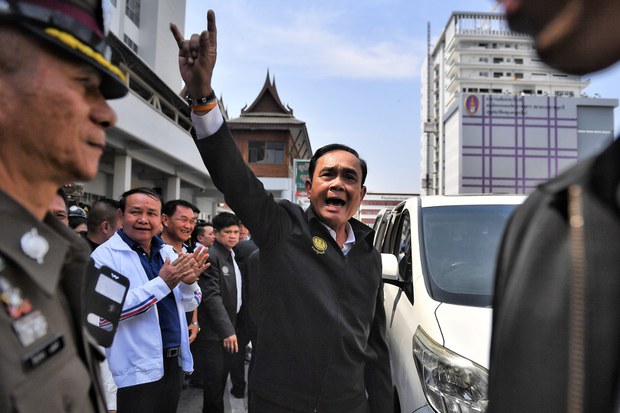Thai PM Prayuth, 5 Deputies Survive No-Confidence Vote
2020.02.28
Bangkok
 Thai Prime Minister Prayuth Chan-o-cha gestures outside of a hospital where victims of a mass shooting at the Terminal 21 shopping mall in the northeastern city of Nakhon Ratchasima were being treated, Feb. 9, 2020.
Thai Prime Minister Prayuth Chan-o-cha gestures outside of a hospital where victims of a mass shooting at the Terminal 21 shopping mall in the northeastern city of Nakhon Ratchasima were being treated, Feb. 9, 2020.
Thailand’s prime minister, who is the ex-junta chief, and five of his deputies on Friday survived the first no-confidence debate against him since he led a military coup in 2014, after a group of opposition MPs boycotted the final vote.
The parliamentarians from the opposition bloc walked out in protest, complaining they were not given enough time to question Prime Minister Prayuth Chan-o-cha and the five deputy ministers.
Lower House Speaker Chuan Leekpai announced that Prayuth had received 272 votes in support, 49 against and 2 abstentions – 22 more than half of the 500-seat lower house of parliament. Because of the boycott and absences, 177 did not vote.
“I feel somewhat relieved that I passed this thing,” Prayuth said after the vote total was announced. “I can have time to handle the tasks that await me.”
The others, Gen. Prawit Wongsuwan, Wissanu Krea-ngam, Anupong Paochinda, Don Pramudwinai and Thammanat Prompao received between 269 and 277 positive votes. Five of the six men are former members of the now-disbanded National Council for Peace and Order (NCPO), the official name of the junta that governed Thailand from May 2014 until after elections in March 2019.
“Give this government justice. We are determined to work with honesty. ... We are not an antagonist to anyone,” Prayuth said. “We have had conflicts for decades that have held back Thailand’s potential for progress.”
Sompong Amornwiwat, leader of the opposition Pheu Thai Party, filed a motion approved by one-fifth of the lower house in January to allow for this week’s no confidence or censure debate. The debate, which began Monday, allowed lawmakers to question Prayuth and the other officials before taking the vote.
Prayuth was accused of failing to handle economic issues properly, of having a bias toward certain business groups and close connections to a rich family to whom he sold land at a high price.
Pheu Thai and other opposition party members walked out ahead of the vote on Friday, amid claims that questioning was cut off too early on Thursday. Two of the ministers, Prawit and Anupong, were not questioned by the lawmakers.
Prayuth appointed himself prime minister after leading that coup that overthrew the elected government of Prime Minister Yingluck Shinawatra six years ago. He was voted in as PM following last year’s election, after a rule change allowed 250 senators appointed by the junta to vote for the top office along with the 500 in the lower house.
Yingluck’s brother, Thaksin Shinawatra, founded and leads the Pheu Thai Party. Like his sister, Thaksin was forced from the prime minister’s office by a military coup in 2006.
Pro-democracy student protests
The parliamentary debate began Monday amid protests by university and high school students after the Constitutional Court last week banned opposition Future Forward Party over a campaign loan from party founder Thanathorn Juangroongruangkit.
On Friday, activist John Winyu called on those who support democracy in Thailand to wear black every Friday to symbolize their resistance to a dictatorship.
An analyst said the latest rallies likely would not lead to deadly violence that marred similar uprisings in the 1970s and 2010.
“I believe the student rallies would not galvanize big-scale protests,” Titipol Phakdeewanich, dean for the faculty of political science of Ubon Ratchathani University told BenarNews. “The government has other mechanisms to contain demonstrations other than military forces including the ministry of education which can order a ban on campus activities.”
Nontarat Phaicharoen in Bangkok contributed to this report.







